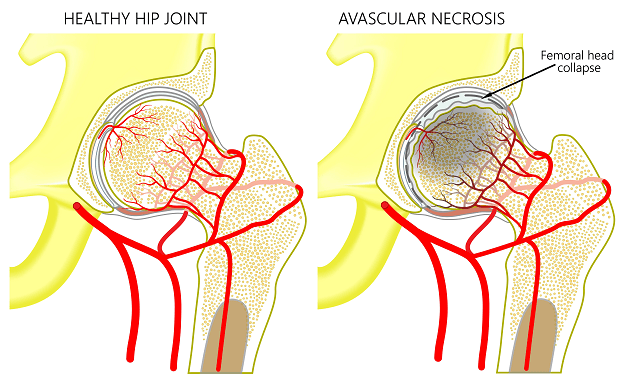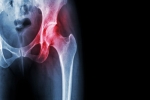Avascular necrosis is a medical condition that affects a patient's bones and joint health, particularly in the hip, knees, shoulders, and (more rarely) the smaller bones in the wrists. This condition can be painful and debilitating, and getting the proper treatment as soon as possible is essential.
What is the best treatment for avascular necrosis? This depends on your condition's severity. It is a persistent condition, so you must take the time to find the proper treatment with the right doctor.
Proper treatment of avascular necrosis includes adequate education and understanding of the disease and the consequences of not seeking treatment.
What Is Avascular Necrosis?
Avascular necrosis (AVN) is a condition that occurs when the blood supply to a bone is disrupted, leading to bone death. Various factors, such as trauma, medical conditions, and medications, can cause this.
The most common causes of avascular necrosis include:
- Injury and trauma (such as fractures) to the bone
- Damage to blood vessels that supply blood to the bone
- Long-term use of certain medications, such as corticosteroids
- Treatment for cancer, such as radiation therapy
- Chronic medical conditions that are known to weaken the bones
- Blood disorders, such as sickle cell anemia
- Excessive/Long term alcohol consumption
Avascular necrosis can cause a variety of symptoms, including:
- Pain in the affected area
- Stiffness
- Swelling
- Difficulty moving the affected joint
Symptoms vary depending on the severity of the condition. For instance, pain can range from mild to severe and can be localized to the affected area or spread to other parts of the body. In some cases, there may be no symptoms at all, making it essential for you to seek medical attention if you notice any changes to your joints or experience unusual pain or swelling.
Diagnosing Avascular Necrosis
 Before delving into the best treatment for avascular necrosis, it must be properly diagnosed.
Before delving into the best treatment for avascular necrosis, it must be properly diagnosed.
Diagnosing avascular necrosis can be notoriously difficult as the most common symptoms are pain, swelling, and stiffness — all of which are common for various conditions. Moreover, patients who don't show any signs are even more likely to be misdiagnosed as they are the most likely not to seek medical attention.
To properly diagnose avascular necrosis, your medical professional will not only have to perform a physical exam and take a detailed medical history, but will also likely have to order diagnostic imaging tests as well, such as:
- X-rays
- CT/CAT scans
- MRI
- Radionuclide bone scan
Depending on the nature of your symptoms, your doctor may also recommend further diagnostic tests such as blood tests or a bone marrow biopsy.
What is the Best Treatment for Avascular Necrosis?
The best treatment for avascular necrosis depends entirely on the individual and the nature of their condition. Once diagnosed, your doctor discusses all possible treatments, including surgical and non-surgical options. While non-surgical treatments, such as medication and therapy, are often the first choice, some more severe cases may require surgery.
Unfortunately, there is no way to reverse the damage caused by avascular necrosis, so treatment focuses on relieving the pain and slowing the progression of bone loss.
Medications for the Treatment of Avascular Necrosis
When caught early enough, certain medications can be used to help treat the symptoms of avascular necrosis. For example, non-steroidal anti-inflammatory drugs (NSAIDs) such as naproxen or ibuprofen can help relieve pain and swelling associated with avascular necrosis. Other medications that may be recommended include:
- Cholesterol Medicine: Lowers the amount of cholesterol and fat in the blood to help prevent further blood vessel blockages.
- Blood Thinners: Prevents blood clots from forming in the vessels that are integral to the bones.
- Osteoporosis Medications: Helps slow the progression of bone loss.
Therapeutic Avascular Necrosis of the Hip Treatment
Another standard treatment for avascular necrosis of the hip is physical therapy. Physical therapy is used to help strengthen the muscles that support the joints and the bones. It also increases the range of motion in the affected joints and improves function, mobility, and quality of life.
Surgical Treatments for Avascular Necrosis
Surgery may be necessary for more advanced cases of avascular necrosis. Surgical options can include bone grafting, which involves replacing the damaged bone with healthy bone from another body part. Joint replacement surgery may also be necessary to replace the damaged joint with an artificial one. In some cases, a combination of both procedures may be required to repair the damage caused by the condition.
Treatment of Avascular Necrosis with Dr. Domb
Avascular necrosis can be a life-changing experience for those who suffer from it. Dr. Domb understands just how much this condition can impact your life, and with help from his dedicated team, they will help you find the best treatment plan for your situation.
No matter how severe your condition is, there is always hope, and our team of medical professionals is here to help you every step of the way.
If you want more information on avascular necrosis, contact Dr. Domb today.





